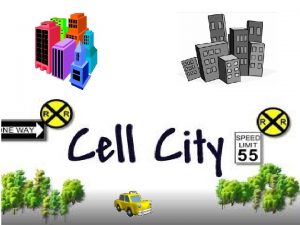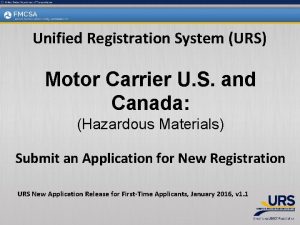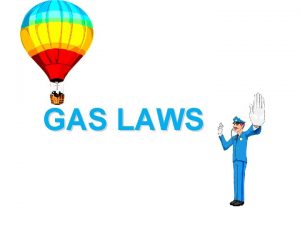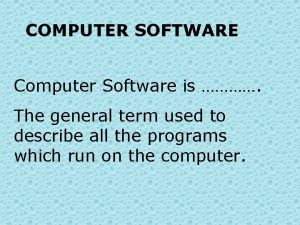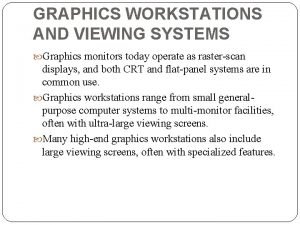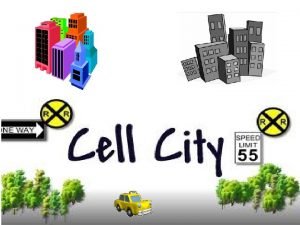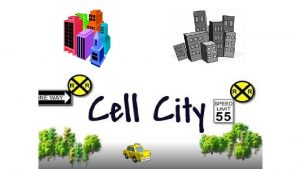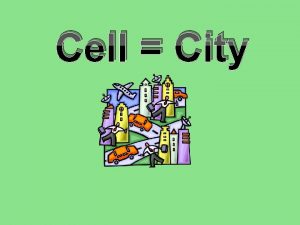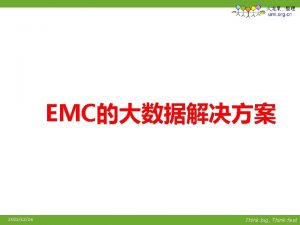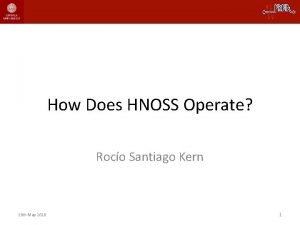Think of a City How does it operate













- Slides: 13


Think of a City • • How does it operate? Who protects the city? Who runs the city? How does the city manage its trash? How does the city get food? How does the city get its power? How do you know when you are in the city limits?

Now think of a Cell • What cell parts do you remember from yesterday? • Do the parts of the cell compare to any parts of a city? • How many can you relate to the parts of a city? – Cell Nucleus? – Mitochondria? ?

A cell can be compared to a city! • Each part of the cell has its own function or purpose. • The parts of the cell can be compared to the parts of a city based on their similar purpose.

Cell City Analogies • An analogy is a similarity between like features of two things, which a comparison can be based on. Endoplasmic Reticulum The road represents the endoplasmic reticulum because they are both transportation systems

Cell Part A. Cell B. Cell Membrane C. Cytoplasm is like City Analogy Purpose City Area with fixed boundary City Limits because Surrounds & border Environment Inner space City Hall Controls the activities Police Force Protects Farm or Factory Makes products G. Endoplasmic Reticulum Roads or Highways Transportation system H. Golgi Bodies Post Office or UPS Packs & carries I. Mitochondria Power Plant or solar panels or windmills Provides power Recycling Plant or Waste Management Recycle & waste disposal Storage Facility – boxes, crates, and plastic bags Stores food and waste L. Chloroplast Green grass within the city Where photosynthesis takes place M. Cell Wall Brick wall surrounding city Gives shape, structure, support, and protection D. Nucleus E. Nuclear Membrane F. Ribosomes J. Lysosomes K. Vacuole

Creating your own Cell = City • You are going to create your own real or imaginary city. • Each part of your city will correspond to a part of the cell. • Look at your worksheet from yesterday. • You must include all the parts needed for your cell (animal or plant). • 11 parts for animal cell • 13 parts for plant cell

Choose an Animal Cell City or a Plant Cell City The plant cell will have two extra parts: Cell Wall Chloroplasts

1. Sketch your city in pencil on large construction paper. 2. Label and circle each part of the city 1. Label each part A-K for animal cell 2. Label each part A-M for plant cell 3. Create a legend in the corner of your city. 4. Color your city completely and neatly

A I C D G B H J E F Legend A: Far Away B: Brick Wall C: Environment D: Shrek’s Castle E: Puss-n-boots Security Service F: Gingerbread Man’s Cookie Factory G: Roads H: 3 Blind Mice Delivery Service I: Dragon Power Service (DPS) J: Donkey Recycling

Final Product • Your Cell City picture must be neat, colorful, correctly labeled, and have a legend or key. • Use pencil first then color (no markers). • Be creative! Have fun with it. • Past examples included • underwater cities, prehistoric cities, skate parks, amusement parks • 11 parts for animal cell • 13 parts for plant cell

Animal Cell City 1. Cell 2. Cell Membrane 3. Cytoplasm 4. Mitochondria 5. Nucleus 6. Lysosome 7. Ribosome 8. Vacuole 9. Golgi body 10. Endoplasmic reticulum 11. Nuclear membrane

Plant Cell City 1. Cell 2. Cell Wall 3. Cell Membrane 4. Cytoplasm 5. Chloroplast 6. Mitochondria 7. Nucleus 8. Lysosome 9. Ribosome 10. Vacuole 11. Golgi body 12. Endoplasmic reticulum 13. Nuclear membrane
 Mukesh ambani signature
Mukesh ambani signature Dynamic of community
Dynamic of community Think said the robin think said the jay
Think said the robin think said the jay Think fam think
Think fam think Think of it as a city
Think of it as a city Unified registration system
Unified registration system Urs motor
Urs motor Combined gas law
Combined gas law E mosfet
E mosfet General term for programs used to operate a computer
General term for programs used to operate a computer Business entities that operate in a duel market structure
Business entities that operate in a duel market structure Two businesses operate in contrasting international markets
Two businesses operate in contrasting international markets Graphics monitor and workstation in computer graphics
Graphics monitor and workstation in computer graphics People who own, operate, and take the risk of a business
People who own, operate, and take the risk of a business




